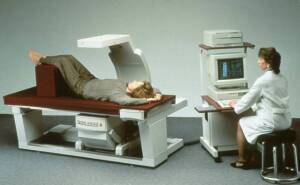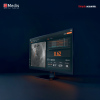Study Suggests Bone Mineral Density May Indicate Breast Cancer Risk
by Astrid Fiano, DOTmed News Writer | August 04, 2008

Measuring a woman's bone
mineral density may help
save her life
mineral density may help
save her life
A new study in the September issue of CANCER, the journal of the American Cancer Society, suggests that measuring a woman's bone mineral density may provide information that can more accurately determine a woman's risk of developing breast cancer. According to the study, incorporating bone mineral density tests with other risk assessments could improve the ability to predict breast cancer in older postmenopausal women.
Bone mineral density testing diagnoses osteoporosis and the risk of fractures. The lower the bone mineral density, the higher the risk of fracture. There might be hormonal factors that contribute to bone mineral density, and also to a higher risk of breast cancer. The study in CANCER, supported by Eli Lilly & Company, is innovative in investigating bone mineral density and its relationship with traditional breast cancer risk assessment and breast cancer incidence among the same group of postmenopausal women.
Dr. Zhao Chen of the University of Arizona Mel and Enid Zuckerman College of Public Health and her colleagues led the study which included approximately 10,000 post-menopausal women who took part in the Women's Health Initiative, a study conducted in 40 clinical centers throughout the United States and supported by the National Heart, Lung and Blood Institute of the National Institutes of Health. The study first assessed the women's initial bone mineral density level. The researcher also measured the study participants' score on the Gail risk model, a common tool that estimates five year and lifetime risk of invasive breast cancer for women 35 years of age or older. The women were then monitored for approximately 8 years.

 As expected, the study determined that women with a high Gail score had a 35 percent increased risk of developing breast cancer compared to women with a lower Gail score. In addition to that score, the study also found a 25 percent increase in the risk of developing the disease with each unit increase in total hip bone mineral density t-score. The two scores were independent of each other, yet there appeared to be an interaction between these factors for the women who had the highest scores on both assessments in having a higher risk in breast cancer.
As expected, the study determined that women with a high Gail score had a 35 percent increased risk of developing breast cancer compared to women with a lower Gail score. In addition to that score, the study also found a 25 percent increase in the risk of developing the disease with each unit increase in total hip bone mineral density t-score. The two scores were independent of each other, yet there appeared to be an interaction between these factors for the women who had the highest scores on both assessments in having a higher risk in breast cancer.
The findings suggest that adding bone mineral density to the current risk assessment tools may significantly improve the prediction of breast cancer risk. "Future studies should investigate whether incorporating bone mineral density and Gail score with other risk factors, such as breast density, can further improve the identification of women at high risk for developing breast cancer," the authors wrote. This study also suggests that bone mineral density is a potential alternative for predicting breast cancer risk in postmenopausal women if Gail score is not available. Additional studies are needed to determine if the results from this investigation are applicable to a broader group of women.
Back to HCB News
Bone mineral density testing diagnoses osteoporosis and the risk of fractures. The lower the bone mineral density, the higher the risk of fracture. There might be hormonal factors that contribute to bone mineral density, and also to a higher risk of breast cancer. The study in CANCER, supported by Eli Lilly & Company, is innovative in investigating bone mineral density and its relationship with traditional breast cancer risk assessment and breast cancer incidence among the same group of postmenopausal women.
Dr. Zhao Chen of the University of Arizona Mel and Enid Zuckerman College of Public Health and her colleagues led the study which included approximately 10,000 post-menopausal women who took part in the Women's Health Initiative, a study conducted in 40 clinical centers throughout the United States and supported by the National Heart, Lung and Blood Institute of the National Institutes of Health. The study first assessed the women's initial bone mineral density level. The researcher also measured the study participants' score on the Gail risk model, a common tool that estimates five year and lifetime risk of invasive breast cancer for women 35 years of age or older. The women were then monitored for approximately 8 years.
Your Centrifuge Specialty Store
Quality remanufactured Certified Centrifuges at Great prices! Fully warranted and backed by a company you can trust! Call or click for a free quote today! www.Centrifugestore.com 800-457-7576

The findings suggest that adding bone mineral density to the current risk assessment tools may significantly improve the prediction of breast cancer risk. "Future studies should investigate whether incorporating bone mineral density and Gail score with other risk factors, such as breast density, can further improve the identification of women at high risk for developing breast cancer," the authors wrote. This study also suggests that bone mineral density is a potential alternative for predicting breast cancer risk in postmenopausal women if Gail score is not available. Additional studies are needed to determine if the results from this investigation are applicable to a broader group of women.
Back to HCB News
1(current)










